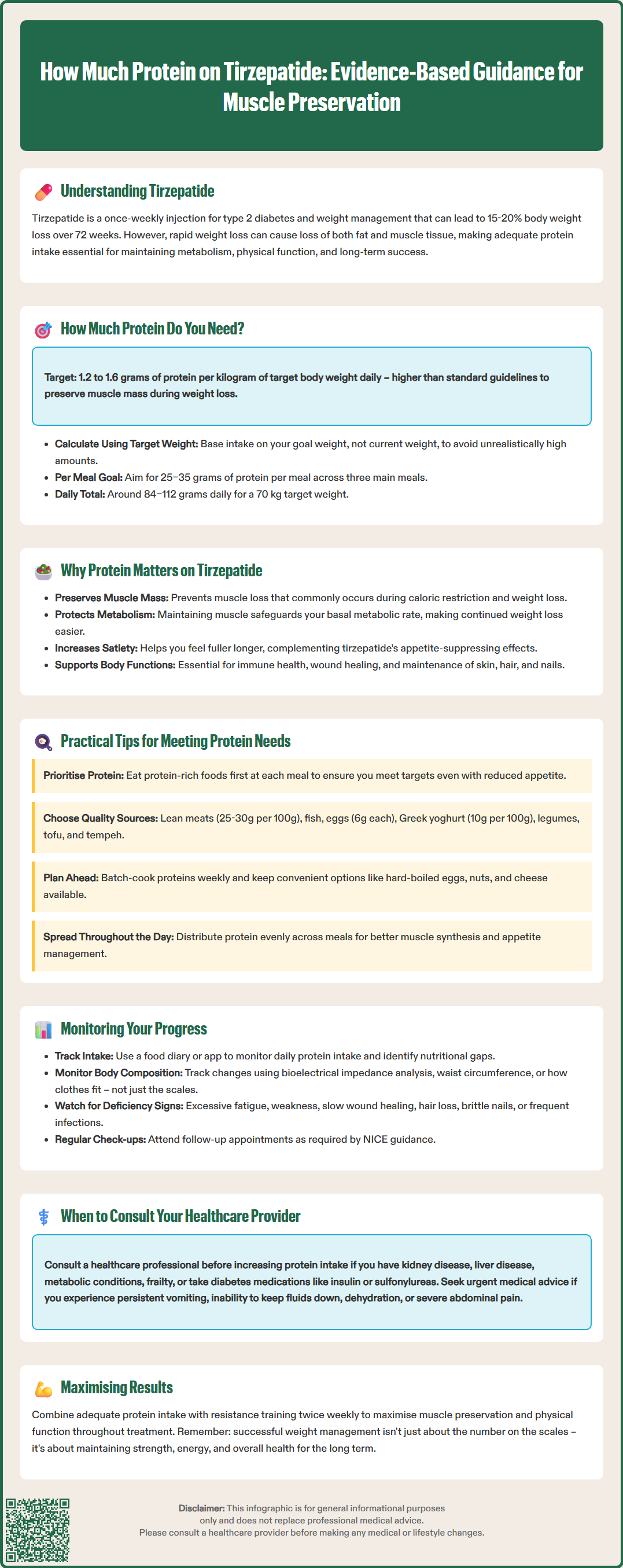
Tirzepatide (Mounjaro for type 2 diabetes, Zepbound for weight management) is a dual GIP/GLP-1 receptor agonist that can lead to substantial weight loss. Whilst this is beneficial for many patients, rapid weight reduction raises important nutritional considerations, particularly regarding protein intake. Adequate dietary protein is essential to preserve lean muscle mass, maintain metabolic health, and support long-term treatment success. This article examines evidence-based protein recommendations for individuals taking tirzepatide, practical strategies for meeting these requirements, and the importance of monitoring nutritional status during treatment.
Quick Answer: Adults taking tirzepatide should aim for 1.2–1.6 grams of protein per kilogram of target body weight daily to help preserve lean muscle mass during weight loss.

Mounjaro® is the most innovative GLP-1 medication proven to dramatically curb appetite, hunger, and cravings to help professional men achieve substantial weight loss.
Start Here
Wegovy® is a weekly injectable GLP-1 medication with proven effectiveness in reducing appetite, hunger, and cravings to help busy professionals lose significant weight.
Start HereTirzepatide is a dual glucose-dependent insulinotropic polypeptide (GIP) and glucagon-like peptide-1 (GLP-1) receptor agonist licensed in the UK for the treatment of type 2 diabetes mellitus (as Mounjaro) and, more recently, for weight management (as Zepbound) in adults with obesity or overweight with weight-related comorbidities. Administered as a once-weekly subcutaneous injection, tirzepatide works by enhancing insulin secretion in response to meals, suppressing glucagon release, slowing gastric emptying, and reducing appetite through central nervous system pathways.
These mechanisms contribute to significant weight loss in many patients, with the SURMOUNT clinical trials demonstrating reductions of 15–20% of body weight over 72 weeks, though results vary by dose and individual factors. In the UK, tirzepatide for weight management is typically prescribed within specialist services in accordance with NICE guidance, with ongoing monitoring and review.
This substantial weight reduction raises important nutritional considerations. When the body loses weight rapidly, it can lose both fat mass and lean body mass (muscle tissue). Preserving muscle mass during weight loss is crucial for maintaining metabolic health, physical function, and long-term weight management outcomes.
Adequate protein intake becomes particularly important during tirzepatide treatment because protein serves as the primary building block for muscle tissue. Without sufficient dietary protein, the body may catabolise existing muscle to meet its amino acid requirements, leading to unfavourable changes in body composition. Furthermore, tirzepatide's effect on appetite suppression and delayed gastric emptying can make it challenging for patients to consume adequate calories and nutrients, including protein. It's also worth noting that patients taking tirzepatide alongside insulin or sulfonylureas may have an increased risk of hypoglycaemia requiring careful monitoring.

Current evidence suggests that individuals taking tirzepatide should aim for a higher protein intake than standard dietary guidelines. The UK Scientific Advisory Committee on Nutrition (SACN) sets the Reference Nutrient Intake (RNI) for protein at 0.75 grams per kilogram of body weight per day for the general adult population.
However, during periods of significant weight loss and caloric restriction, many clinical experts recommend 1.2 to 1.6 grams of protein per kilogram of target body weight daily to help preserve lean muscle mass. For physically active individuals, intakes towards the higher end of this range may be appropriate. These calculations should generally be based on a clinically appropriate target weight rather than current weight in patients with obesity, as using current weight could result in unrealistically high protein targets.
For practical purposes, this translates to approximately 25–35 grams of protein per meal for most adults, distributed across three main meals. For example, a person with a target weight of 70 kg should aim for approximately 84–112 grams of protein daily. This might include a breakfast with two eggs and Greek yoghurt (approximately 25g protein), a lunch with grilled chicken breast and quinoa (approximately 35g protein), and an evening meal with salmon and vegetables (approximately 30g protein), with additional protein from snacks if needed.
Important: These recommendations should be individualised with healthcare professional guidance. People with chronic kidney disease, liver disease, certain metabolic conditions, or frailty should seek advice from their GP or a registered dietitian before significantly increasing protein intake. Patients with diabetes who take insulin or sulfonylureas should be aware that changing meal patterns and protein intake may affect blood glucose control.
Preserving lean muscle mass is the primary reason adequate protein intake is critical during tirzepatide treatment. Research consistently demonstrates that during periods of caloric restriction and weight loss, the body loses both adipose tissue and lean tissue. Without adequate protein intake and resistance exercise, a significant proportion of weight lost may come from muscle rather than fat, though this varies by age, activity level, and degree of energy deficit. This loss of muscle mass can have several detrimental consequences.
Muscle tissue is metabolically active, meaning it burns calories even at rest. Loss of muscle mass reduces basal metabolic rate, making it progressively harder to lose weight and easier to regain weight after treatment. Additionally, muscle loss can impair physical function, reduce strength and mobility, and negatively impact quality of life, particularly in older adults. Maintaining muscle mass through adequate protein intake helps preserve metabolic rate and supports long-term weight management success.
Protein also plays a crucial role in satiety and appetite regulation. High-protein foods are generally more satiating than carbohydrates or fats, helping patients feel fuller for longer periods. This can be particularly beneficial when combined with tirzepatide's appetite-suppressing effects, as it may help patients feel satisfied with smaller portions whilst still meeting their nutritional needs. Protein has a higher thermic effect of food compared to other macronutrients, meaning the body expends more energy digesting and metabolising protein.
Furthermore, adequate protein intake supports immune function, wound healing, and the maintenance of other body tissues including skin, hair, and nails. During significant weight loss, ensuring sufficient protein helps maintain these essential physiological functions. Following the UK Chief Medical Officers' Physical Activity Guidelines by including resistance training twice weekly can further support muscle preservation during weight loss.
Meeting increased protein requirements whilst experiencing reduced appetite can be challenging for patients on tirzepatide. Prioritising protein at each meal is an effective strategy—aim to consume your protein-rich foods first before filling up on other components of your meal. This ensures you meet your protein targets even if you cannot finish your entire plate.
High-quality protein sources should form the foundation of your dietary approach, aligned with the NHS Eatwell Guide. Lean meats such as chicken breast, turkey, and lean cuts of beef or pork provide approximately 25–30 grams of protein per 100-gram serving. Fish, particularly oily fish like salmon, mackerel, and sardines, offer both protein and beneficial omega-3 fatty acids. Eggs are an excellent, versatile protein source, with each large egg providing approximately 6 grams of protein. Plant-based options include legumes (beans, lentils, chickpeas), tofu, tempeh, and edamame, though these typically require larger portions to match the protein density of animal sources.
Dairy products can significantly contribute to daily protein intake. Greek yoghurt contains approximately 10 grams of protein per 100 grams, whilst cottage cheese provides even more. Milk, cheese, and protein-fortified dairy alternatives can be incorporated into meals and snacks. For patients struggling to meet protein targets through whole foods alone, protein supplements such as whey protein powder, casein, or plant-based protein powders can be mixed into smoothies, porridge, or other foods. When choosing supplements, check labels for added sugars and saturated fats.
Meal planning and preparation are essential for success. Consider batch-cooking protein sources at the beginning of the week, keeping hard-boiled eggs readily available, and having convenient protein-rich snacks such as nuts, cheese, or protein bars on hand. Be mindful of portion sizes for energy-dense foods like nuts, cheese and protein bars, as these can contribute significant calories. Spreading protein intake evenly throughout the day, rather than consuming most at one meal, may improve muscle protein synthesis and help manage appetite more effectively.
Note: People with chronic kidney disease should consult a renal dietitian before increasing protein intake. Those with diabetes should consider the carbohydrate content of protein foods and supplements, particularly if taking insulin or sulfonylureas.
Regular monitoring of both dietary intake and treatment outcomes is essential for optimising results with tirzepatide. Keeping a food diary, either using a smartphone application or written journal, can help you track your daily protein intake and identify patterns or gaps in your nutrition. Many apps can calculate protein content automatically and provide feedback on whether you are meeting your targets. This awareness often helps patients make more informed food choices throughout the day.
Body composition changes are more valuable to monitor than weight alone. Whilst bathroom scales show total weight loss, they cannot distinguish between fat loss and muscle loss. In specialist weight management services, bioelectrical impedance analysis (BIA) may be available to assess body composition. Dual-energy X-ray absorptiometry (DEXA) scanning is not routinely available on the NHS for body composition monitoring but may be used selectively in some clinical settings. Simple measures like waist circumference, how clothes fit, and physical function can also provide useful information about your progress.
Pay attention to clinical indicators that may suggest nutritional concerns. These include excessive fatigue, weakness, slow wound healing, hair loss, brittle nails, or frequent infections. If you experience these symptoms, discuss them with your GP or prescribing clinician. Healthcare professionals may use validated nutrition screening tools such as the Malnutrition Universal Screening Tool (MUST) rather than relying on blood tests like albumin, which is not a reliable marker of protein status in outpatients.
Regular follow-up appointments with your healthcare team are crucial. NICE guidance for tirzepatide requires ongoing monitoring, with specific criteria for continuing treatment based on weight loss targets. Your GP or specialist may refer you to a registered dietitian for personalised nutritional guidance, particularly if you have complex dietary needs, food intolerances, or are struggling to meet protein targets.
Seek urgent medical advice if you experience persistent vomiting, inability to keep fluids down, signs of dehydration, severe or persistent abdominal pain, or other concerning symptoms while taking tirzepatide. Contact your GP or NHS 111 promptly in these situations. Report any suspected side effects to the MHRA Yellow Card Scheme (yellowcard.mhra.gov.uk) to help monitor the safety of this medication.
Protein requirements should generally be calculated using a clinically appropriate target body weight rather than current weight in patients with obesity, as using current weight could result in unrealistically high and impractical protein targets.
Yes, protein supplements such as whey, casein, or plant-based protein powders can help meet daily targets when whole food intake is insufficient due to reduced appetite. Check labels for added sugars and saturated fats, and discuss supplementation with your healthcare team.
Individuals with chronic kidney disease, liver disease, certain metabolic conditions, or frailty should consult their GP or a registered dietitian before significantly increasing protein intake, as higher protein diets may not be appropriate for these conditions.
All medical content on this blog is created based on reputable, evidence-based sources and reviewed regularly for accuracy and relevance. While we strive to keep content up to date with the latest research and clinical guidelines, it is intended for general informational purposes only.
DisclaimerThis content is not a substitute for professional medical advice, diagnosis, or treatment. Always consult a qualified healthcare professional with any medical questions or concerns. Use of the information is at your own risk, and we are not responsible for any consequences resulting from its use.